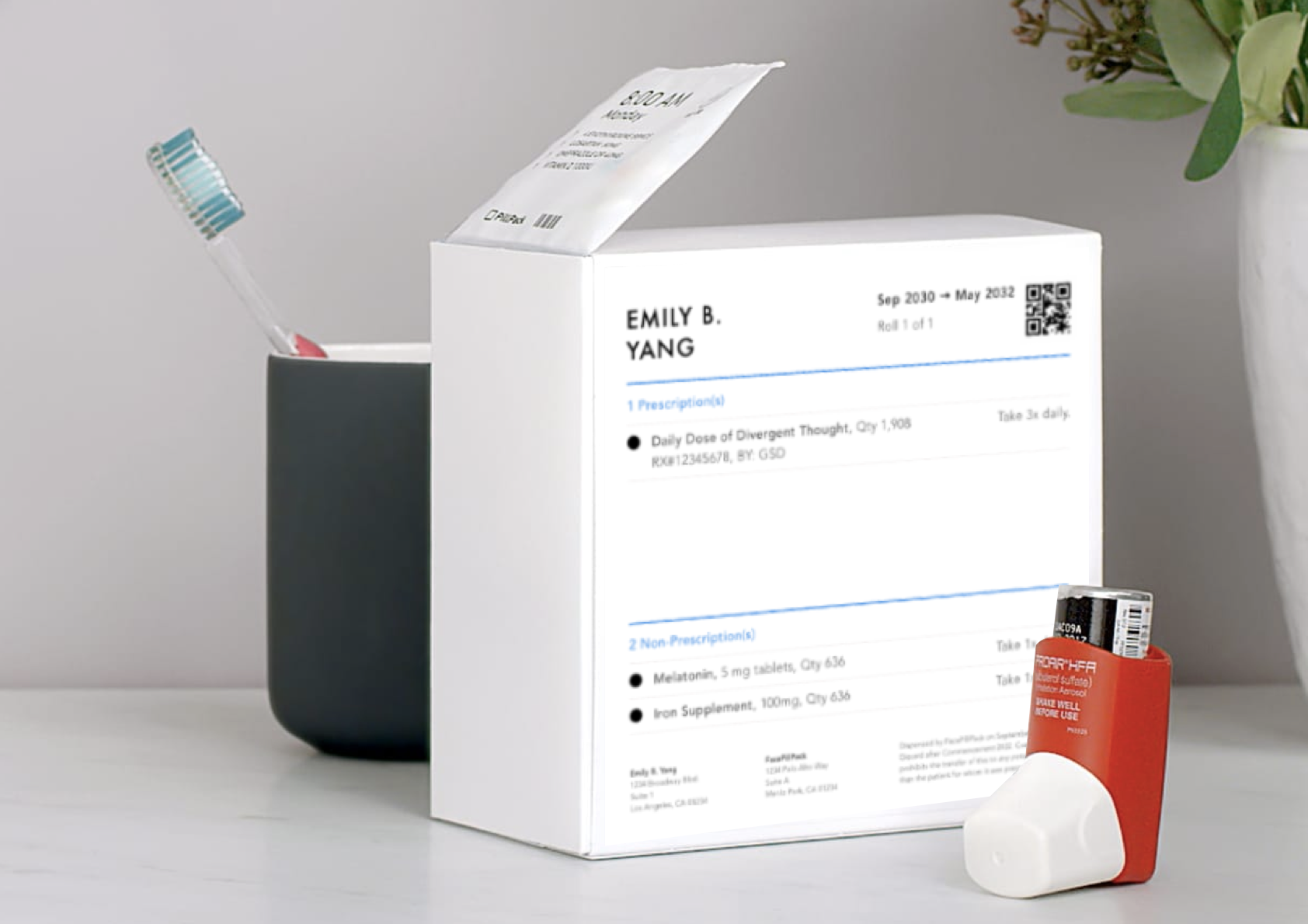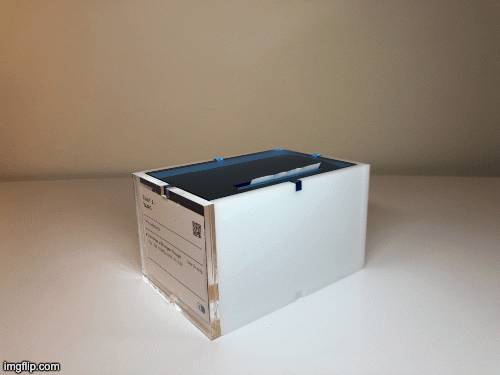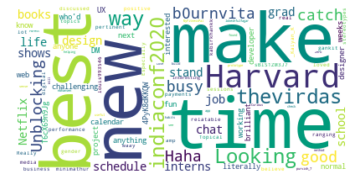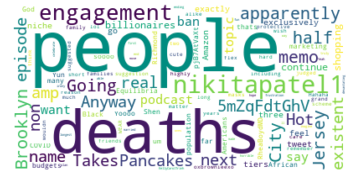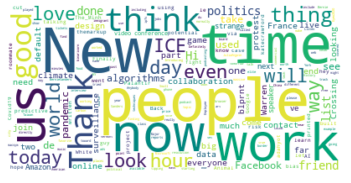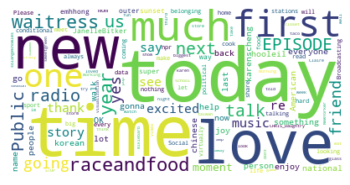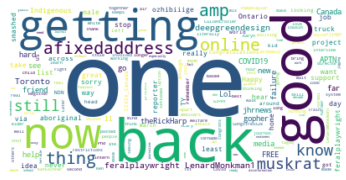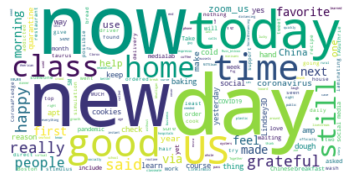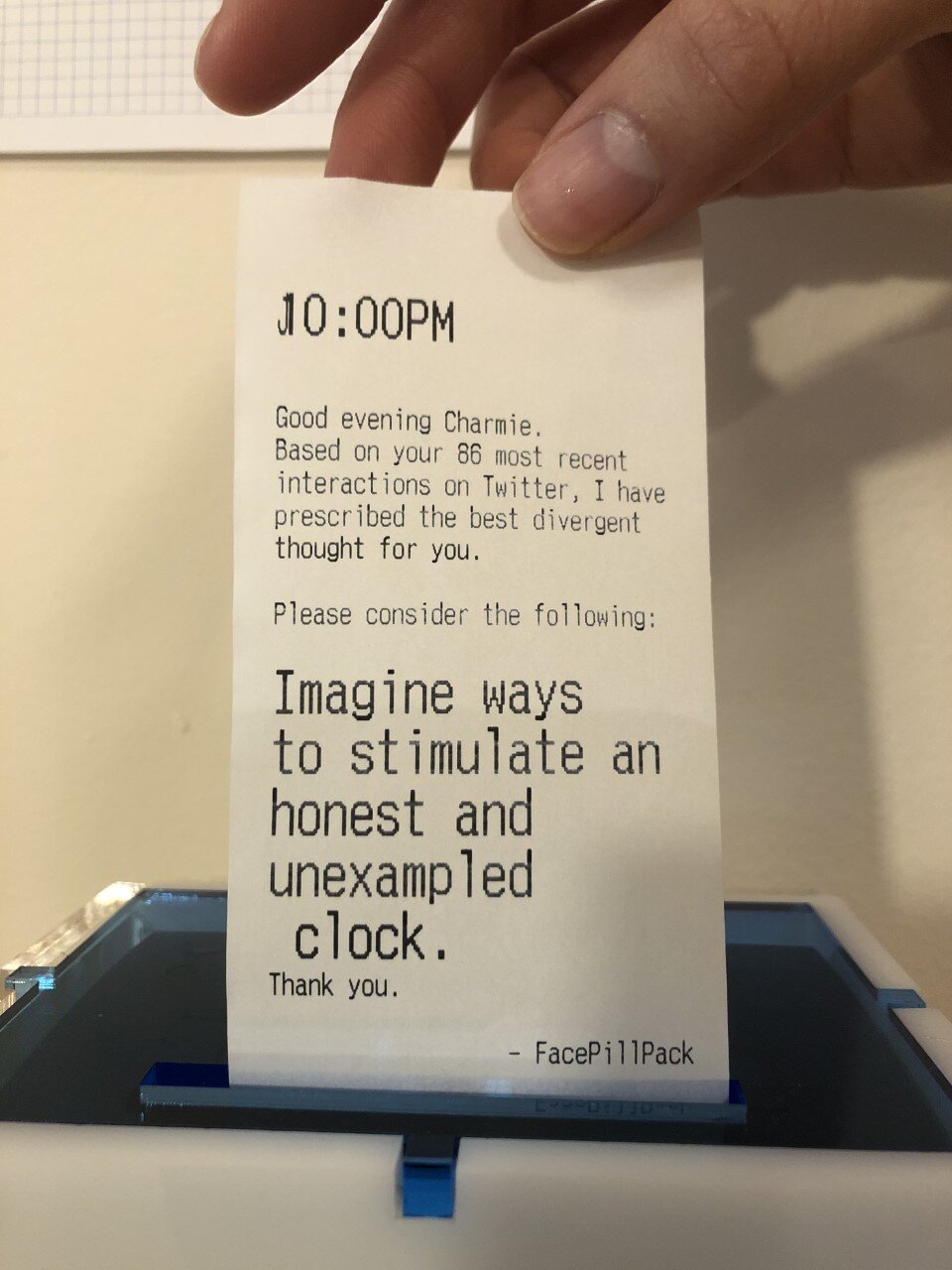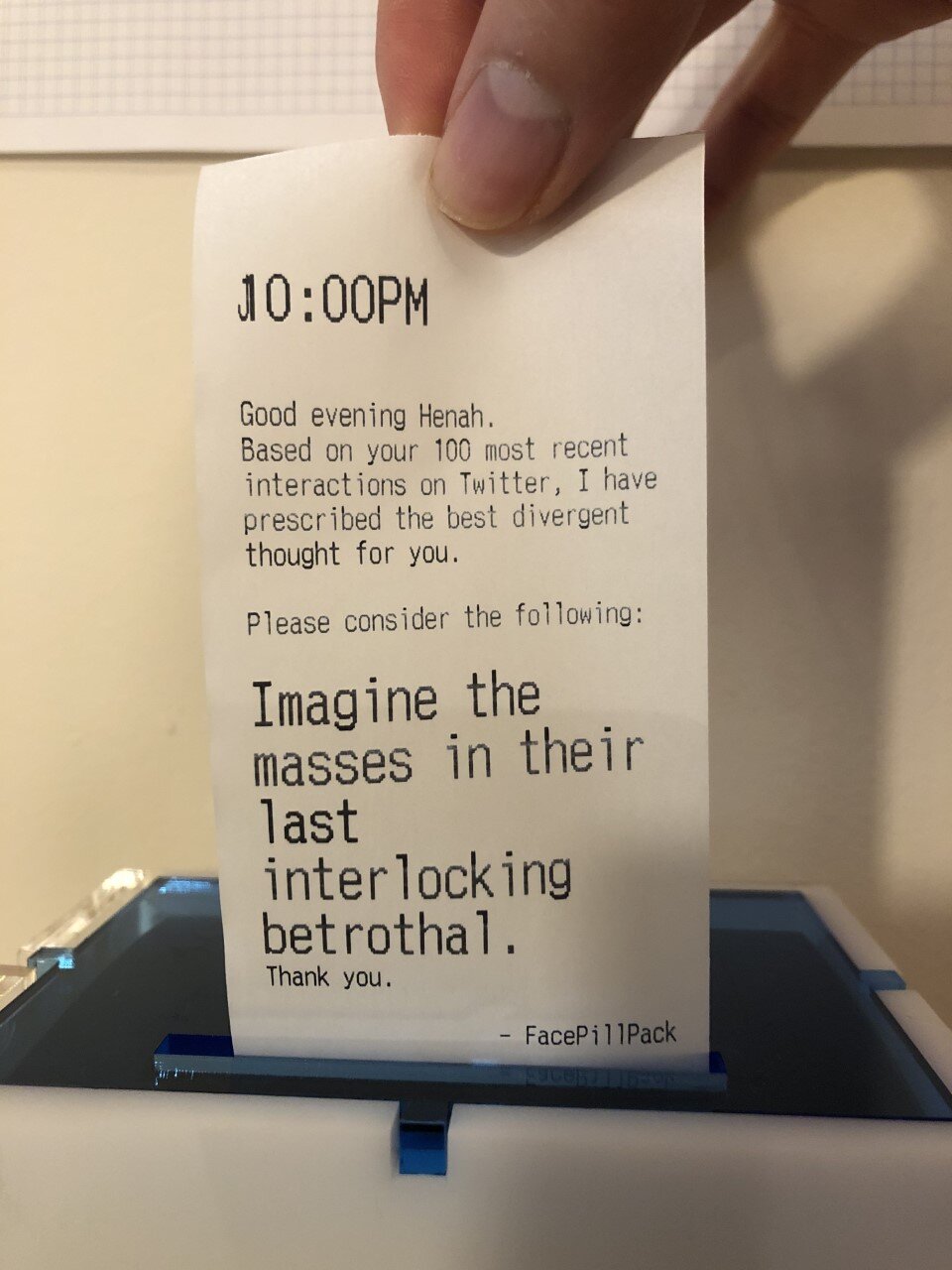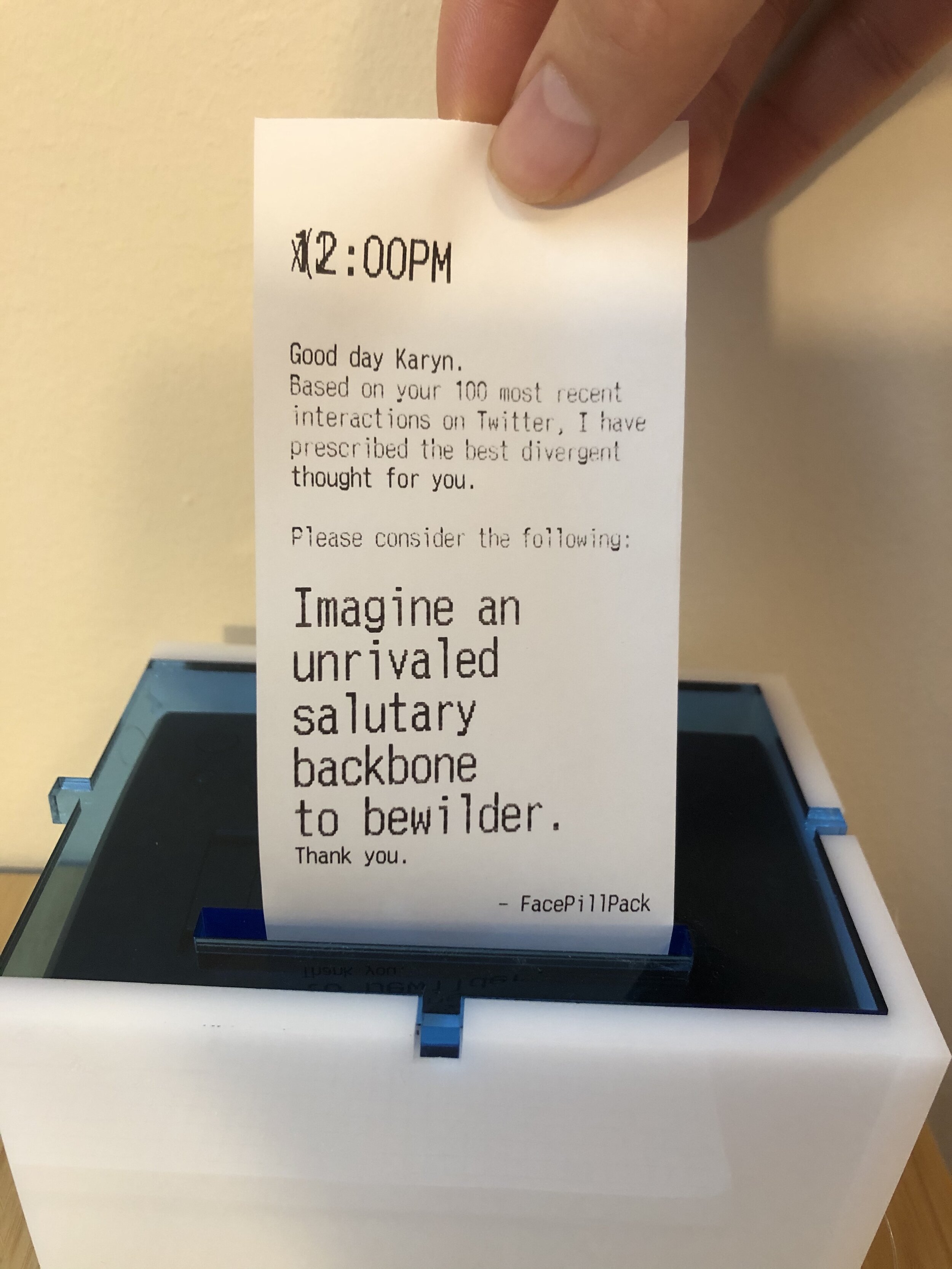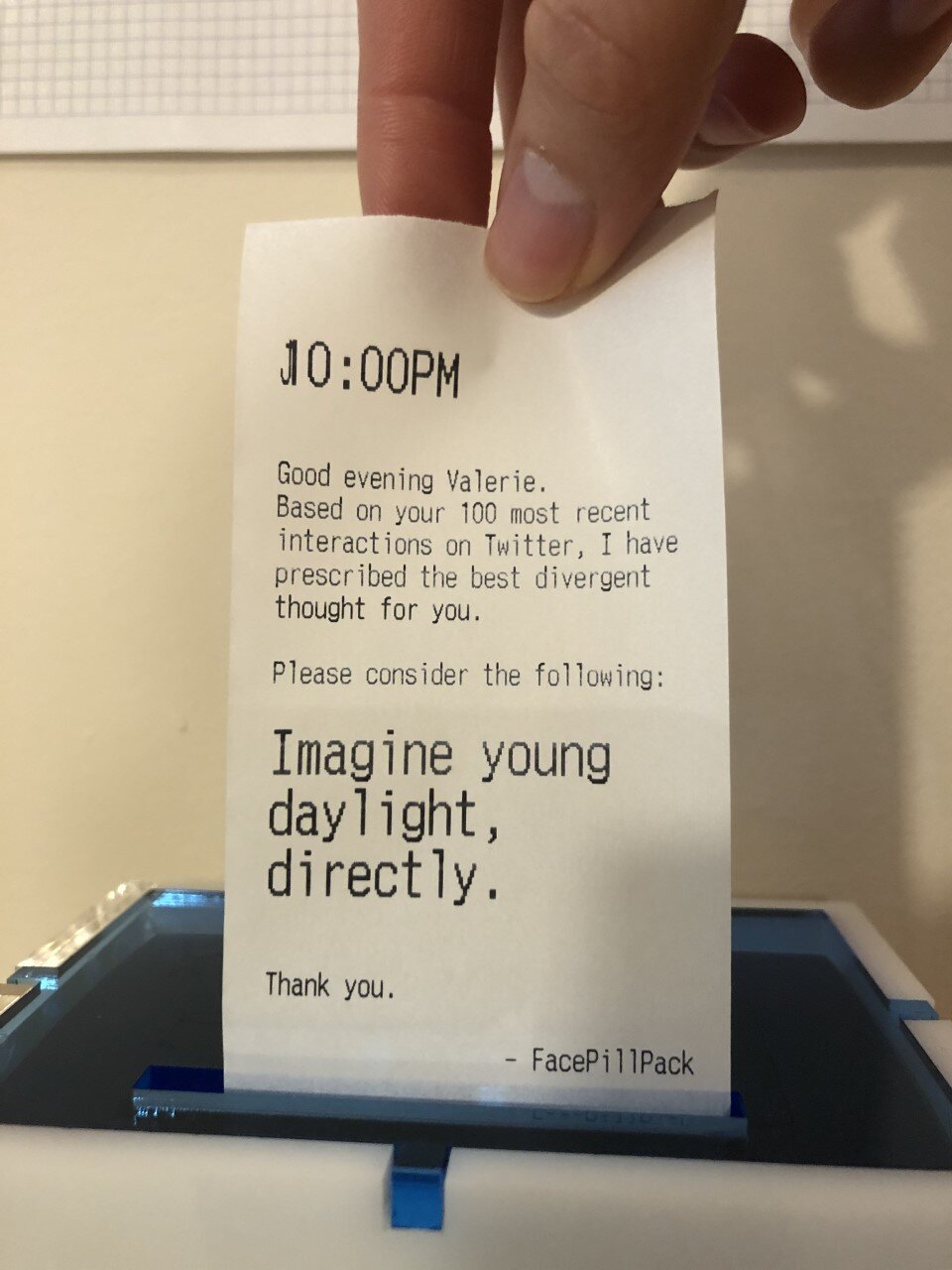FacePillPack*
Your daily dose of divergent thought.
2019, MIT Media Lab
Project Type: Data Science, Prototyping, Speculative Design, Design Fiction
*the result of a Facebook x Amazon merger (now Famazon) in 2027
OVERVIEW
This is my final project for MIT Media Lab’s Fixing Social Media Course, offered Spring 2020 with Ethan Zuckerman.
FacePillPack is an artifact from a design fiction that invites viewers to speculate on the future state of social media. FacePillPack is a speculative design project; a playful nod towards Pillpack, the Amazon company taking messy and hard to organize medication from different sources, and presenting it in a simple form - a PillPack. This project aims to do the same, only with social media.
Final Project Prompt:
Social media can make us more extreme and dwell in our echo chambers.
AND It is hard for us to eat our social media vegetables.*
WHAT COULD THE FUTURE OF SOCIAL MEDIA LOOK LIKE?
*a notion by Tristan Harris that “rather than dismantling the entire attention economy, [it is possible to] create a healthier alternative to the current diet of tech junk food.”
ABSTRACT
FacePillPack is a strange artifact from the future that provokes viewers to question current practices of engaging with social media and divergent thought. Its name references the future merger of Facebook and Amazon, in a world that pushed the notion of “technology and its implicit totalitarism” to the extreme. In the future, every person will be required to consume their doses of divergent thought from the machine, or else be prohibited from engaging with necessary services.
This is a speculative design project that imagines a 2030 with Big Tech Governance by companies such as Famazon (a result of the Facebook and Amazon merger of 2027), Apple and Google. In this design fiction, these companies have largely replaced the democratic governing bodies in the United States. As a way to keep a sense of civility during times of extreme political polarization, these entities require their users to consume daily doses of divergent thought based on their online behavior.
The questions I want to provoke with this project are:
What if in the future, social media creates separate realities that never intersect? We already see these trends today. What if social media companies try to solve this problem themselves?
FACEPILLPACK: HOW IT WORKS
Design Fiction:
”Design fiction is a design practice aiming at exploring and criticising possible futures.” (1) Through creating speculative, alternatives futures, narrated by artifacts from them, we can explore new ideas and have new discussions. “Design fiction as a communication and social object creates interactions and dialogues around futures that were missing before. It helps make it real enough for people that you can have a meaningful conversation with.” (2)
To create a speculative future, I examined trends that are evident now, and pushed them further. For instance, political polarization online and online echochambers already exist now. They still intersect in small ways, but in the future, what if we dwell in completely separate realities? What if the responsibility or burden of a society that resembles a peaceful democracy then falls on tech companies? In lieu of a functioning governing body, corporations like Google, Facebook and Amazon could step in to find ways to create moments for interacting with opposing opinions, fueled by their existing practices of surveillance capitalism.
(1)Dunne, Anthony; Raby, Fiona (2013). Speculative Everything.
(2)Smith, Scott (2016). "Insights: Scott Smith". Medium. Design Fiction.
Why does it matter
Social media can make us more extreme and dwell in echo chambers. And breaking out of those echo chambers is hard. Eating our social media “vegetables” by consuming other types of media that challenge our world view and show us different perspectives is important, but difficult.
The importance of chance encounters with other views is well articulated by Cass Sunstein, author of Republic: “It’s great if you come across ideas and topics that you didn’t specifically select. That can change your day and even your life. A great city exposes you to all sorts of people and ways of life, serendipitously. A great university does the same. So does a well-functioning information market. Serendipity is crucial because it expands your horizons. You need that if you want to be free.” The ability to run into separate ideas and opinions is critical to a functioning democracy.
What has been done to address this issue
Resources like The Righting, Abridge News, and Kialo recognize the importance of exposing people to opposing views. However, it requires that the recognition and awareness from the user that they could be engaging in social media practices that provide biased views of the world. Furthermore, it then requires the additional effort from the user to then find a resource like The Righting, Abridge News and Kialo to intentionally expose themselves to media that may make them angry or upset.
Printer Prototype: Lasercut + Arduino + Mini Thermal Printer
EXPERIMENT + Design Research Findings
While working on FacePillPack, I asked for participants to try an early prototype of FacePillPack. I asked for their Twitter accounts and scraped their interactions on Twitter; including posts, comments and responses. I used their data to them to generate their wordclouds.
Using these wordclouds, I printed divergent thoughts using NTLK (natural language toolkit) to generate “synonyms” and find alternative meanings to keywords for each of them and sent it to them each individually, along with a survey link asking for feedback and reactions.
RESULTS
Afterwards, I asked the participants to write their reactions and responses to the experiment. Some reactions from my participants:
Incredible! Actually an amazing prompt in the true sense of the word - thought provoking in many ways - abstract yet coherent
I like that it was more of a thought than a command -- but my initial instinct seeing the thought was to post about it or come up with that "unexampled and passionate sentence" and not sure what to do with that new thought.
It reminds me of a fortune cookie, but feels more special and personalized. I wasn't sure what it meant, but it was definitley evocative and made me wonder what I had said in my Tweets. Good for thinking new thoughts and reflecting on what I've said.
I really enjoy the surrealist vibe of the divergent thought. It's like a digital version of tarot cards.
REFLECTION
As a designer, I really enjoyed using speculative design in imagining a solution for this problem. So many problems seem systemic and unfixable. By speculating about the future, it made these systemic issues feel more flexible; as if the future really could be made more malleable than it currently seems. As a designer, I wanted to play on the notion of technology and its implicit totalitarianism. Making a physical prototype was fun and intentional, because the physicality of it is unexpected and purposefully disruptive to the all-consuming experience of social media.

